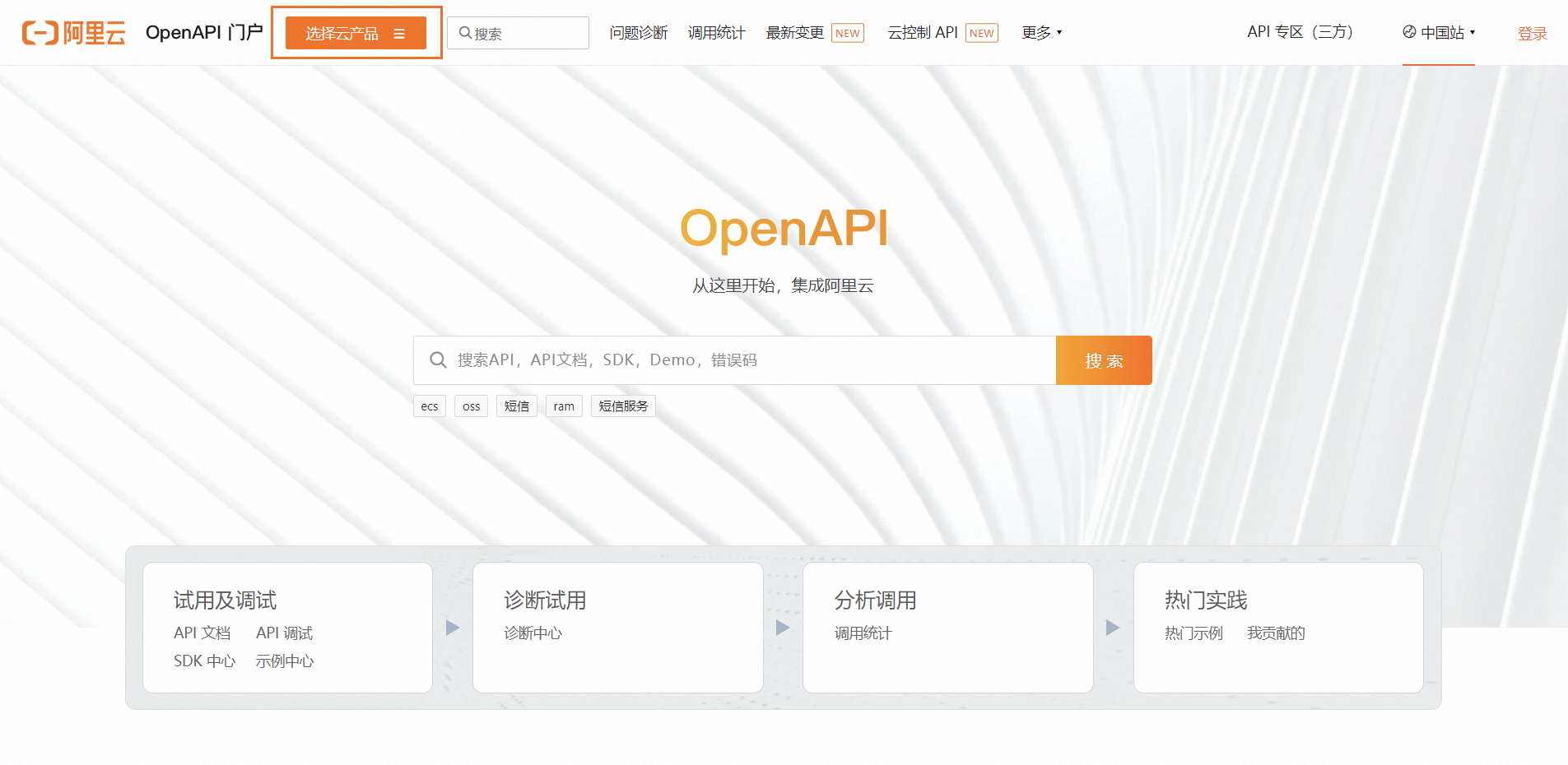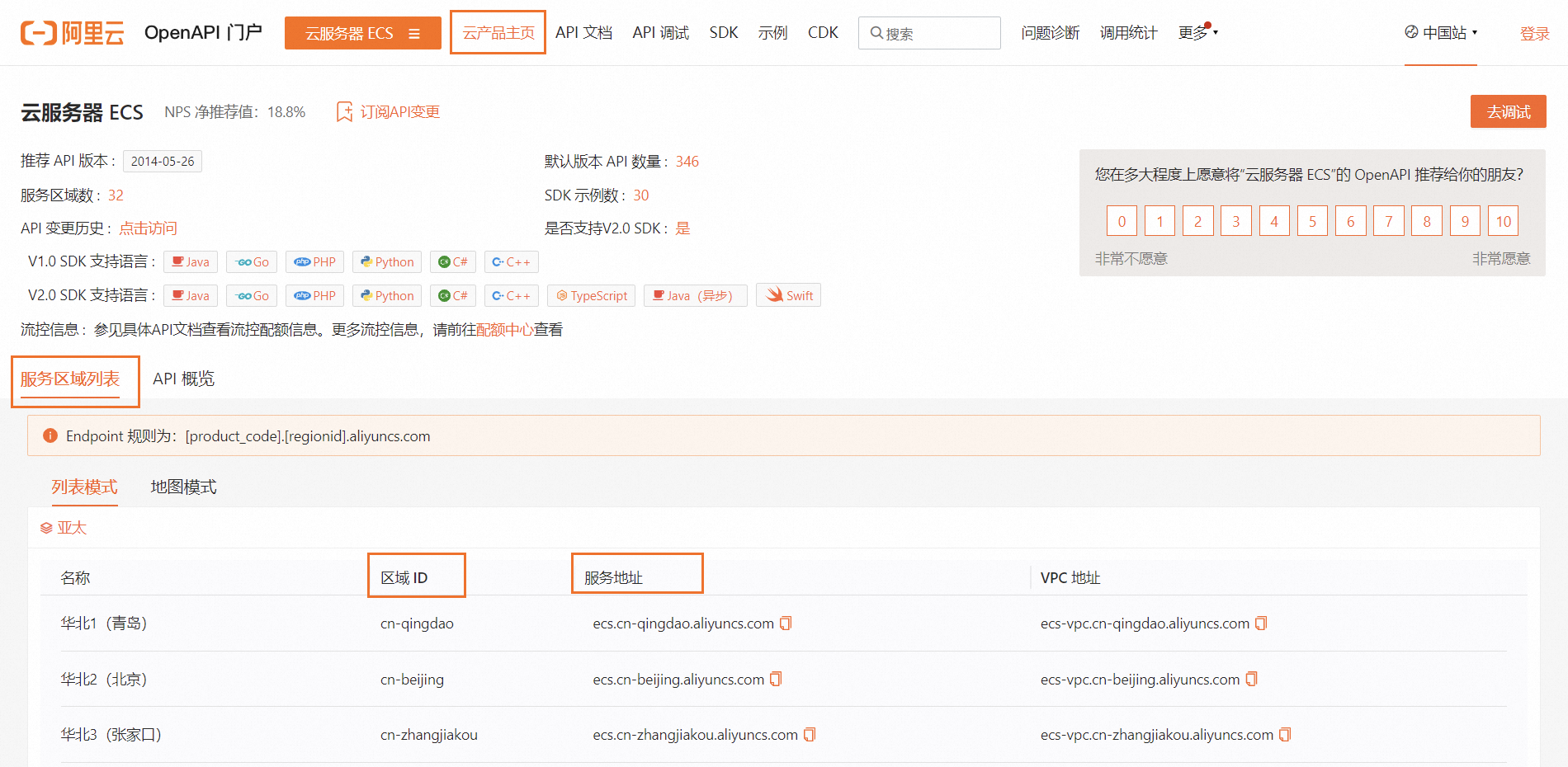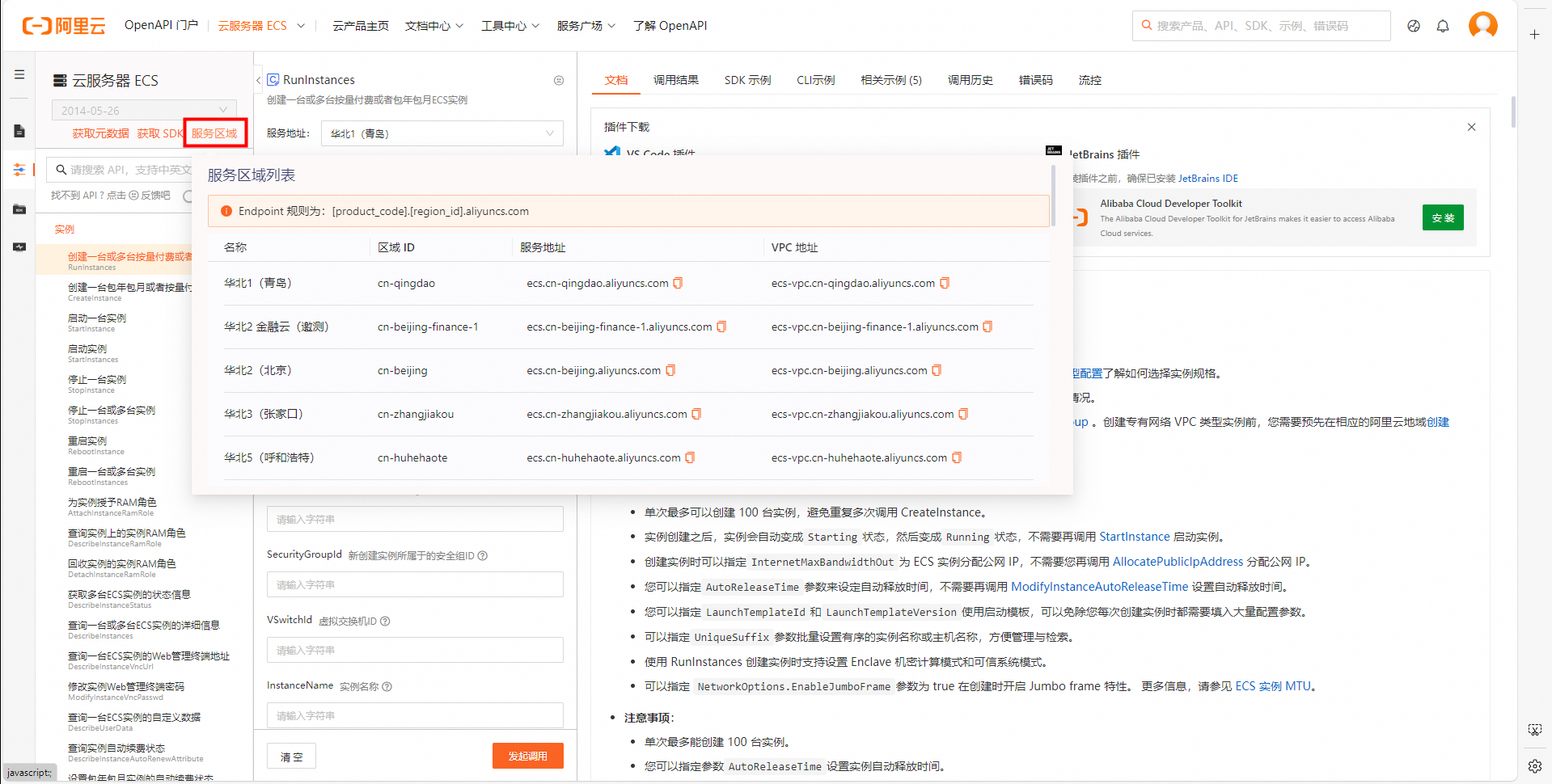Endpoint配置
Endpoint又叫服务接入点,是请求接口服务的网络域名,如产品ECS在杭州地域的Endpoint:ecs.cn-hangzhou.aliyuncs.com。每个产品都有其独立的Endpoint,并且Endpoint与服务区域RegionId有关,不同地域可能是不同的Endpoint。本节主要介绍V2.0 SDK对于Endpoint的配置。
Endpoint类型
服务接入点主要有两类:公网服务地址、VPC服务地址,更多信息请参见服务接入点。
Endpoint设置
V2.0 SDK提供了两种Endpoint设置方式,下面按优先级排列:
建议您使用自定义Endpoint方式设置。
自定义Endpoint:用户可以通过在初始化客户端时指定Endpoint,产品的Endpoint可以通过OpenAPI 开发者门户的产品主页中查找,具体参考文末。
import com.aliyun.ecs20140526.Client; import com.aliyun.teaopenapi.models.Config; public class Sample { public static void main(String[] args) throws Exception { com.aliyun.teaopenapi.models.Config config = new Config(); config.setAccessKeyId(System.getenv("ALIBABA_CLOUD_ACCESS_KEY_ID")); config.setAccessKeySecret(System.getenv("ALIBABA_CLOUD_ACCESS_KEY_SECRET")); // 设置服务域名 endpoint config.setEndpoint("<endpoint>"); Client client = new Client(config); } }自定义RegionId:
若请求的产品SDK中存在RegionId和Endpoint关系对象,且传入的RegionId在该对象中时,则从关系对象中获取Endpoint。
若请求的产品SDK没有RegionId和Endpoint关系对象,或者传入的RegionId不在关系对象中时,则根据拼接规则自动拼接Endpoint。
import com.aliyun.ecs20140526.Client; import com.aliyun.teaopenapi.models.Config; public class Sample { public static void main(String[] args) throws Exception { Config config = new Config(); config.setAccessKeyId(System.getenv("ALIBABA_CLOUD_ACCESS_KEY_ID")); config.setAccessKeySecret(System.getenv("ALIBABA_CLOUD_ACCESS_KEY_SECRET")); // 通过 regionId 映射到 endpoint config.setRegionId("<regionId>"); Client client = new Client(config); } }
VPC Endpoint使用场景
使用阿里云SDK方式调用OpenAPI时,若业务场景有以下需求,建议设置阿里云VPC Endpoint:
业务系统同时存在于本地机房和云上机房,基于阿里云VPC搭建不同的业务模块,构建完全隔离的云上环境,云上云下通过公网进行业务交互。
基于阿里云VPC搭建云上数据中心,通过专线与云下内部数据中心打通,进行用户核心数据安全保障,完美应对业务激增及数据快速同步,实现混合云方案。
基于阿里云VPC搭建多个应用,各应用都需要对外提供服务,且其波峰时间点不一致,希望多IP共享带宽,尽量减小波峰波谷效应从而降低成本。
云上业务完全基于VPC构建,用户遍布各个区域,为提升用户访问速度,业务系统同样位于不同节点,需实现各节点之间的网络高速互联。
获取文件上传授权码的Endpoint
部分OpenAPI支持设置开放平台Endpoint,如果不设置,则使用默认的公网服务地址。它底层业务逻辑是调用文件上传鉴权服务,获取鉴权和默认对象存储(OSS)的相关信息。
以视觉智能开放平台的检测人体计数接口设置VPC Endpoint为例:
import com.aliyun.facebody20191230.models.DetectBodyCountAdvanceRequest;
import com.aliyun.facebody20191230.models.DetectBodyCountResponse;
import com.aliyun.teaopenapi.models.Config;
import com.aliyun.teautil.models.RuntimeOptions;
import com.google.gson.Gson;
import java.io.File;
import java.io.FileInputStream;
import java.io.InputStream;
public class Sample {
public static void main(String[] args) throws Exception {
Config config = new com.aliyun.teaopenapi.models.Config();
config.setAccessKeyId(System.getenv("ALIBABA_CLOUD_ACCESS_KEY_ID"));
config.setAccessKeySecret(System.getenv("ALIBABA_CLOUD_ACCESS_KEY_SECRET"));
config.setRegionId("<regionId>");
// 设置通过 OSS 内网地址上传文件,如需完全内网环境请打开注释
// config.setEndpointType("internal");
com.aliyun.facebody20191230.Client client = new com.aliyun.facebody20191230.Client(config);
// 根据 regionId 设置鉴权服务的 VPC请求地址,例如杭州 openplatform-vpc.cn-hangzhou.aliyuncs.com
client._openPlatformEndpoint="openplatform-vpc.<regionId>.aliyuncs.com";
RuntimeOptions runtimeOptions = new RuntimeOptions();
// 读取文件并实例化文件流
File f = new File("<your-file-path>");
InputStream in =new FileInputStream(f);
DetectBodyCountAdvanceRequest request = new DetectBodyCountAdvanceRequest();
request.setImageURLObject(in);
DetectBodyCountResponse resp = client.detectBodyCountAdvance(request, runtimeOptions);
// response 包含服务端响应的 body 和 headers
System.out.println(new Gson().toJson(resp.body));
System.out.println(new Gson().toJson(resp.headers));
}
}附:Endpoint查找方式
产品的Endpoint可以通过在OpenAPI门户上寻找:
在门户顶部菜单选择云产品,例如ECS:

2. 在云产品主页找到服务区域列表:

3. 选择相应RegionId所对应的Endpoint,进行复制粘贴即可。
还可以在API调试界面,在左侧栏单击服务区域,查看云产品支持的Endpoint。

